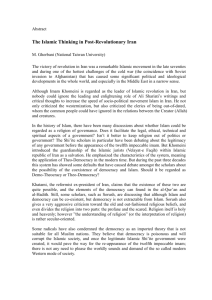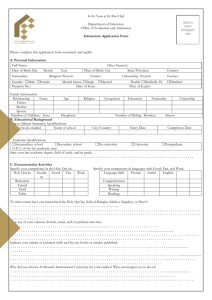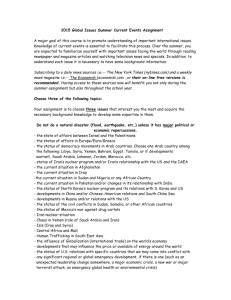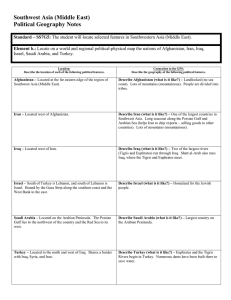Panel II Comments David Waldner Oil and Despots in the Middle East
advertisement
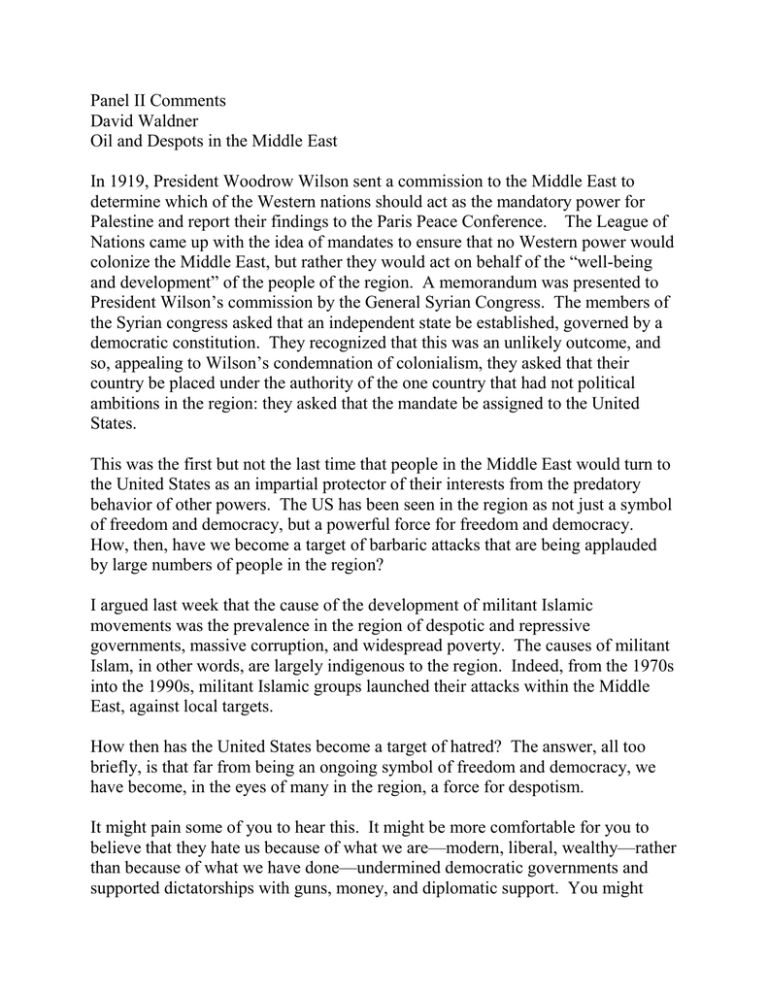
Panel II Comments David Waldner Oil and Despots in the Middle East In 1919, President Woodrow Wilson sent a commission to the Middle East to determine which of the Western nations should act as the mandatory power for Palestine and report their findings to the Paris Peace Conference. The League of Nations came up with the idea of mandates to ensure that no Western power would colonize the Middle East, but rather they would act on behalf of the “well-being and development” of the people of the region. A memorandum was presented to President Wilson’s commission by the General Syrian Congress. The members of the Syrian congress asked that an independent state be established, governed by a democratic constitution. They recognized that this was an unlikely outcome, and so, appealing to Wilson’s condemnation of colonialism, they asked that their country be placed under the authority of the one country that had not political ambitions in the region: they asked that the mandate be assigned to the United States. This was the first but not the last time that people in the Middle East would turn to the United States as an impartial protector of their interests from the predatory behavior of other powers. The US has been seen in the region as not just a symbol of freedom and democracy, but a powerful force for freedom and democracy. How, then, have we become a target of barbaric attacks that are being applauded by large numbers of people in the region? I argued last week that the cause of the development of militant Islamic movements was the prevalence in the region of despotic and repressive governments, massive corruption, and widespread poverty. The causes of militant Islam, in other words, are largely indigenous to the region. Indeed, from the 1970s into the 1990s, militant Islamic groups launched their attacks within the Middle East, against local targets. How then has the United States become a target of hatred? The answer, all too briefly, is that far from being an ongoing symbol of freedom and democracy, we have become, in the eyes of many in the region, a force for despotism. It might pain some of you to hear this. It might be more comfortable for you to believe that they hate us because of what we are—modern, liberal, wealthy—rather than because of what we have done—undermined democratic governments and supported dictatorships with guns, money, and diplomatic support. You might reject my words completely as those of a radical who is not to be trusted. So let me make the point with someone else’s words. Our speaker is James Schlesinger, who taught economics here at UVA in the 1950s, served as the chief of the Central Intelligence Agency and then Secretary of Defense in the early 1970s. The text is from an article he wrote about eight years ago in Foreign Affairs, which is the People Magazine of the Washington Foreign Policy Crowd. An even deeper question is whether we seriously desire or prescribe democracy as the proper form of government for other societies. Perhaps the issue is most clearly posed in the Islamic world. Do we seriously want to change the institutions of Saudi Arabia? The brief answer is no; over the years we have sought to preserve those institutions, sometimes in preference to more democratic forces coursing throughout the region. King Fahd has stated quite unequivocally that democratic institutions are not appropriate for his society. What is interesting is that we do not seem to disagree. In neighboring Kuwait, a nation whose renewal has depended on American power, we have been far more concerned with restoring legitimacy than with fostering democracy. In Algeria - when its military removed its president, suspended democratic elections and perpetuated the power of the traditional political elite - we readily acquiesced in the outcome. We swallowed our scruples (however strong they may be) because we shared the concern regarding the consequences of a fundamentalist victory. Do we really want to press greater democratization on Egypt? It would unlikely be beneficial either to our friend and ally, President Mubarak, or to Egyptian stability. Similar observations might be made about Tunisia, Morocco or even Jordan. Indeed, in the Middle East the Islamic state that has most successfully embraced democratic processes is none other than Iran. Yet few would suggest that we hold Iran in higher regard or that our relations are warmer than with other states in the region - to say nothing of whether we prefer a more democratic Iran than the Iran of the shah. The point is not that we should cease to preach American values or that we should fail to express delight when other societies move closer to democracy. The point is that, even before we examine the trade-offs regarding economic growth or ancillary actions regarding foreign policy or countless other matters, we must conclude that, at best, the fostering of democracy is a delicate and quite tenuous guide to policy. (Source: James R. Schlesinger, “Quest for a post-Cold War Foreign Policy,” Foreign Affairs 72/1 (Winter 1993), at page 20. Now let’s be clear about a couple of points. First, for the most part, the US has supported these dictatorships but did not create them. Second, to repeat a point I made last week, US actions do not in any way determine how people will respond to them. In no meaningful sense can it be claimed that the US provoked these attacks, caused these attacks, or deserved these attacks. Most people in the region are moderate and peaceful, even as they detest much of what we have done. The small number of extremist respond as they do for reasons I cannot fully comprehend. Some of it is outright paranoia; some of it outright hatred. Think in terms of what statisticians call the Law of Large Numbers. Low probability events rarely occur, but given sufficient opportunities, they will. Most people in the region are moderate and peaceful; but when you continuously antagonize a billion people, a small percentage of them are likely to respond. And when you consider that the US has itself trained and armed these militants, then you can’t be all that surprised that they have attacked us. Do they hate us? Absolutely. Do they hate us b/c of our values? Yes, that’s part of it. Are we morally virtuous, innocent bystanders in all of this? Well, no. The Law of Large Numbers suggests a solution: reduce the number of people who hate us and you reduce the number of people who will choose violence. The moral of that story is that we should uphold our values, not trample on them. Now John Owen poses a powerful challenge. Being a critic is easy, he says. I can’t help but wonder why there aren’t more of us then. John makes a strong case that in every instance, the US did what the logic of the situation compelled it to do; there were no superior options. My first reaction is that John overestimates the degree of necessity involved in each case. He argues that had we not supported the Afghani rebels, Pakistan and Iran would have fallen into the Soviet ambit next. That is the old “domino theory” which helped lead us into the Vietnamese quagmire: and John recognizes that that war was a mistake. We know that the Soviets invaded Afghanistan with great reluctance. If it was a decisive shift in the balance of power of southwest Asia that the Soviets were after, then they would have invaded Afghanistan far earlier. And let’s not forget, during this time, we were supporting Iraq against Iran, not defending Iran from Soviet incursions. The other problem that I have with John’s analysis is that he takes individual instances out of context. I refer specifically to his discussion of the Gulf War. Yes, Saddam Hussein posed a serious challenge to our interests in 1990; but in some important and indirect respects, we helped create that challenge ourselves. So rather than thinking about what to do in each concrete situation, my point is that we have to think about avoiding those situations. To do that, we have to take a longer historical view. Let me briefly sketch that out. Our story begins in the late 1960s, when Great Britain announces it will soon remove its remaining military bases from the Persian Gulf, where they have been safeguarding western access to the largest proven oil reserves in the world. This came at a particularly bad time for the US, as we were bogged down in Vietnam. So the Nixon Administration applied in the region their solution to the Vietnam crisis: they turned the responsibility for local security over to regional allies: in this case, Saudi Arabia and Iran. This in turn entailed a massive build up of those countries militaries, which was quite lucrative for American military contractors and was financed by the 1974 oil embargo which roughly quadrupled oil prices. The US clearly acquiesced in this decision b/c it would be a way to finance our regional security policy. But note that it was the threat of Iranian nationalization of oil in the early 1950s that led the US to help overthrow a democratically elected government in the first place. As the Shah built up his military, two things happened. First, he became increasingly autocratic and alienated from his own population. Second, he began to take a more militant stance against Iraq. Two things followed: the Iranian Revolution of 1979, which brought an Islamic government to power, and then the Iran-Iraq War of 1980, when Saddam Hussein thought he could seize the opportunity of chaos in Iran to assert his own regional ambitions. Well, we know what happened. Although Iraq, a nominally socialist government with strong ties to the Soviet Union, had previously been a country against whose threats we were arming Iran, now we made an abrupt about face and began supporting Iraq against Iran. Now you might think that it makes sense to support a socialist government against an Islamic regime, but just next door, we were supporting the Afghani Islamic militias against the Soviet Union! And it wasn’t just Afghanis who were doing the fighting; facing its own militants, Saudi Arabia was shipping thousands of Arabs over to Afghanistan to fight against the Soviets. This is when Osama Bin Laden first went to Afghanistan to receive training from the CIA. Fast forward ten years: the Iran-Iraq war is over. The Iraqi economy is bankrupt, but Saddam Hussein has lots of military power at his disposal, including the beginnings of programs to develop weapons of mass destruction, programs whose parts are being supplied by western companies and financed in part by US taxpayers. Broke but powerful, he looks across the border and sees Kuwait, a country militarily weak but very wealthy. The result, I’m sure you know, is the Gulf War, during which time US troops take up positions in Saudi Arabia. The result of that war is that Saddam Hussein is still in power, but we have imposed a ten-year economic embargo on Iraq that has had minimal effect on the regime but has caused unbelievable suffering for the civilian population, and thereby lending credibility to Bin Laden’s claims that the US is at war with Muslims. Follow the logic here: we support Iran, leading indirectly to an Islamic Revolution and a war with Iraq; so we support Iraq, leading indirectly to the invasion of Kuwait and the Gulf War. We support various Afghani militias, who are joined by Arab militants at the behest of our allies the Saudis. All three of our former allies turn against us: Iran, Iraq, mujahidin groups fighting in Afghanistan. And what about the Taliban? They are largely a product of our other sometimes allies, the Pakistanis. We are currently getting cozy with Pakistan again: we don’t have much of a choice, since our other former allies are either enemies or, in the case of the Saudis, scared to admit that they need our support and busy cranking out the most amazing anti-American invective from their government publishing houses. If past history is any guide, we’ll be at war with Pakistan soon, and that’s scary, b/c Pakistan is a nuclear power. So when John asks for an alternative solution to each situation, I say that he has asked the wrong question. The proper question for me is, Could we have done anything to prevent those situations? I think the answer is supporting democracy; had we supported democracy consistently from 1945 on, an alternative history would have resulted that would not have had his examples in it. Without an autocratic Shah, the Islamic Revolution becomes far less likely. No Islamic revolution, no tilt toward Iraq; no invasion of Kuwait, no Gulf War, no embargo on Iraq.

